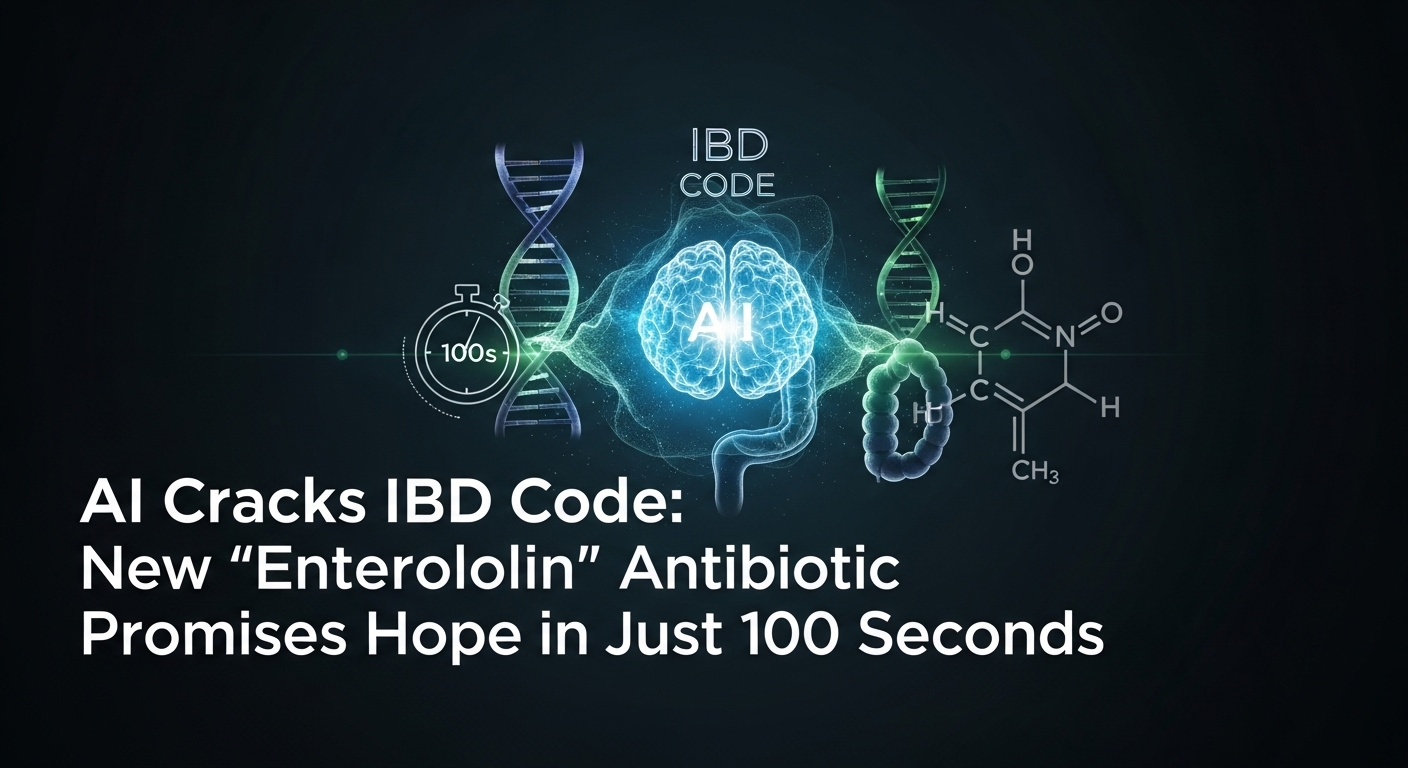AIがわずか100秒で特定!炎症性腸疾患(IBD)に革命をもたらす新抗生物質「エンテロリリン」の衝撃
医療とテクノロジーの融合が、また一つ画期的な進歩を遂げました。今回、人工知能(AI)が炎症性腸疾患(IBD)の治療に新たな光を当てる可能性のある画期的な抗生物質「エンテロリリン」を、驚くべき速さで発見しました。従来の広域抗生物質とは異なり、有害なバクテリアのみを標的とするこの初の薬剤は、クローン病などの難病に苦しむ何百万人もの患者に希望をもたらすと期待されています。
AIが導いた驚異の100秒:作用機序の解明が劇的に加速
今回の発見の中心にあるのは、AIの目覚ましい能力です。マクマスター大学とMITの研究チームは、生成AIモデル「DiffDock」を活用し、エンテロリリンが細菌内でどのように機能するか、つまりその「作用機序(MOA)」をわずか100秒で予測することに成功しました。このプロセスは、通常、研究者が数年を費やし、数百万ドルの費用がかかるものです。AIの予測後も、研究チームは実験室での検証に約6ヶ月を要しましたが、それでも従来の医薬品開発と比較すると、時間とコストを劇的に削減できたことになります。 このAIによる作用機序の高速解明は、薬物開発における長年のボトルネックを解消するものであり、科学者たちがより迅速かつ効率的に新薬を開発する道を拓きます。
「エンテロリリン」とは?:狙い撃ちする精密な抗生物質
「エンテロリリン」は、炎症性腸疾患の病原性細菌を特異的に標的とする「狭域スペクトル抗生物質」という点が画期的です。 従来の広域抗生物質は、腸内の善玉菌と悪玉菌の区別なく攻撃するため、腸内マイクロバイオームのバランスを崩し、かえって症状を悪化させるリスクがありました。これは、まるで「ナイフの喧嘩に大槌を持っていく」ようなもので、炎症性腸疾患の患者にとっては特に深刻な問題でした。
しかし、エンテロリリンは異なります。AIの予測とその後の検証により、この薬剤は特定の細菌(特にクローン病の再燃に関連する大腸菌株)に存在する「LolCDE」と呼ばれるタンパク質複合体に結合することが明らかになりました。 LolCDE複合体は細菌の生存に不可欠な外膜リポタンパク質の輸送に関与しており、これを阻害することで病原性細菌のみを効果的に排除します。 これにより、有益な腸内細菌を温存しつつ、病原菌だけを「精密誘導弾」のように攻撃することが可能になります。
炎症性腸疾患治療に新たな希望を
クローン病や潰瘍性大腸炎といった炎症性腸疾患(IBD)は、消化管に慢性的な炎症を引き起こし、腹痛、下痢、体重減少などの症状で患者の生活の質を著しく低下させる難病です。 現在、これらの病気には根本的な治療法がなく、症状の管理が主な治療となります。 エンテロリリンのような、腸内環境を破壊することなく特定の病原菌を排除できる治療法は、IBD患者にとってまさに待望のものです。 この新薬は、症状を緩和し、より質の高い生活を送るための大きな助けとなる可能性を秘めています。
未来への展望:臨床試験とAI創薬の加速
この画期的な発見は、まだ研究段階にありますが、その実用化に向けた動きも加速しています。この研究を主導したジョン・ストークス教授のスピンアウト企業であるStoked Bioは、エンテロリリンのライセンスを取得し、人間での使用に向けた最適化を進めています。目標は、今後数年以内、具体的には3年以内の人間での臨床試験開始を目指すことです。 また、エンテロリリンが他の薬剤耐性菌、例えば肺炎の原因となるクラミジア・ニューモニアエなどにも有効である可能性も検討されており、その応用範囲の広さにも期待が寄せられています。
今回の成果は、AIが単に既存の分子をスクリーニングするだけでなく、薬の作用機序を予測し、医薬品開発のプロセス全体を革新する強力なツールであることを示しています。 AIと人間の専門知識が協働することで、これまで想像もできなかったスピードと効率で、医療の未解決の課題が克服されていく、そんな未来がすぐそこまで来ていることを実感させられるニュースです。
AI Unleashes Precision Strike: ‘Enterololin’ Antibiotic Revolutionizes IBD Treatment in Record Time
For millions worldwide, inflammatory bowel disease (IBD), encompassing debilitating conditions like Crohn’s disease and ulcerative colitis, presents a relentless challenge. Patients often face a lifetime of painful symptoms, frequent flare-ups, and limited treatment options, with conventional broad-spectrum antibiotics frequently causing more harm than good by indiscriminately wiping out beneficial gut bacteria alongside harmful pathogens. However, a monumental leap in medical science, spearheaded by a pioneering collaboration between McMaster University and MIT, is offering a new beacon of hope. Researchers have unveiled a groundbreaking antibiotic, dubbed ‘Enterololin,’ specifically designed to target the culprits behind IBD with unparalleled precision, and astonishingly, an AI sequencing tool predicted its mechanism of action in a mere 100 seconds.
The Double-Edged Sword of Traditional Antibiotics in IBD
Inflammatory bowel diseases are characterized by chronic inflammation of the digestive tract, often linked to an imbalance in the gut microbiome. While antibiotics are sometimes prescribed during IBD flare-ups, their broad-spectrum nature can be detrimental. These “nukes,” as McMaster Assistant Professor Jon Stokes describes them, destroy both pathogenic and beneficial bacteria, leading to a disrupted microbiome. This imbalance can inadvertently create opportunities for drug-resistant strains, like certain E. coli, to proliferate and worsen the disease, turning a temporary solution into a long-term problem.
Enterololin: A New Era of Targeted Therapy
The newly discovered antibiotic, Enterololin, represents a paradigm shift in IBD treatment. Unlike its broad-spectrum predecessors, Enterololin is a narrow-spectrum drug. This means it meticulously targets only a specific group of harmful bacteria, particularly those within the Enterobacteriaceae family, which includes the types of E. coli strongly implicated in Crohn’s disease. By preserving the integrity of the crucial gut microbiome while eliminating disease-causing pathogens, Enterololin offers the potential for effective treatment without the damaging collateral effects seen with conventional antibiotics.
In preclinical studies, specifically mouse models of Crohn’s-like inflammation, Enterololin demonstrated remarkable efficacy. Mice treated with the drug recovered faster and maintained a healthier microbiome compared to those treated with common broad-spectrum antibiotics like vancomycin. This targeted approach notophen clears existing infections but also significantly reduces the risk of drug-resistant strains taking hold in the gut, a critical concern in antimicrobial stewardship.
AI: The Catalyst for Unprecedented Speed and Precision
While the discovery of Enterololin itself is a monumental achievement, the story is further amplified by the revolutionary role of artificial intelligence. Typically, identifying how a new drug works—its “mechanism of action” (MOA)—is a painstaking process that can take years and cost millions of dollars. However, in an unprecedented demonstration of AI’s power, MIT’s DiffDock AI model predicted Enterololin’s MOA in an astonishing 100 seconds.
This AI model quickly identified that Enterololin interacts with a microscopic protein complex called LolCDE, which is essential for the survival of certain bacterial strains. While human researchers then spent approximately six months experimentally validating the AI’s prediction, this AI-guided approach dramatically accelerated the drug discovery timeline. The entire process, from initial prediction to validation, was completed in a fraction of the time and cost associated with traditional methods—six months and $60,000, compared to two years and $2 million.
This achievement, detailed in Nature Microbiology on October 3, 2025, marks a global first for AI in predicting a drug’s mechanism of action before experimental validation. It underscores how AI is not just a tool for screening potential drug candidates but can also provide crucial mechanistic explanations, vital for moving a molecule through the development pipeline.
A New Dawn for IBD Patients
The implications of this breakthrough for the millions of individuals suffering from IBD are profound. With no definitive cure for conditions like Crohn’s disease, the development of Enterololin offers a promising new treatment option that could significantly improve patients’ quality of life by alleviating symptoms and mitigating the risks associated with current broad-spectrum antibiotic use.
Jon Stokes, the principal investigator on the study, highlights the urgency for effective treatments, noting that IBD affects thousands of individuals across Canada alone. The prospect of a drug that can reduce symptoms without destabilizing the microbiome could mean a meaningful improvement in daily struggles for those living with chronic inflammatory bowel conditions.
The Road Ahead: Human Trials and Beyond
The journey from discovery to clinical application has already begun. Stoked Bio, a spin-out company founded by Jon Stokes, has secured the rights to Enterololin and is currently optimizing the drug for human trials. These crucial trials are projected to commence within the next few years, bringing this revolutionary treatment closer to patients.
This success story also signals a broader narrative about the urgent need for novel antibiotics in an era of escalating antimicrobial resistance. The innovative collaboration between human intellect and advanced computational tools, as showcased by McMaster and MIT, provides a compelling model for the future of drug discovery. AI is proving to be an indispensable tool, guiding researchers to make more informed and swifter decisions, ultimately unlocking new biological possibilities and accelerating the path to life-changing therapies.
